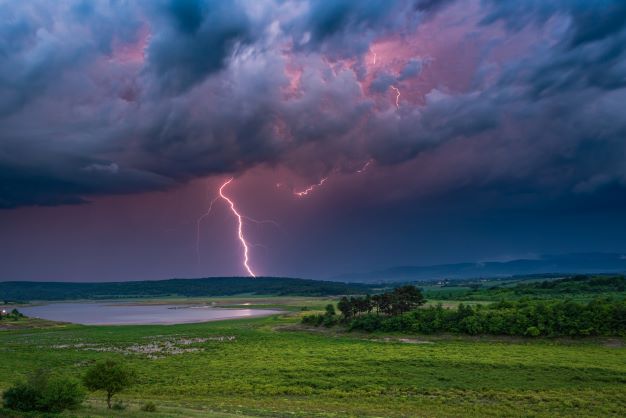Stay safe and stay smart! Never venture out onto the water during a thunderstorm. Lightning is unforgiving and typically heads towards the highest point around – which could be you with your fishing rod! Don’t become another statistic; don’t risk your life. Every year fishermen die from lightning strikes, and more are injured, it is simply not worth the risk.
But that’s not all – lightning isn’t the only threat out there. High winds and heavy rain, which often accompanies storms can turn a peaceful fishing trip into a dangerous ordeal. Don’t underestimate the power of Mother Nature.
So, make the sensible choice: avoid fishing during thunderstorms. Protect yourself, your loved ones, and your fellow fishermen. Your life is invaluable, and no catch is worth the risk. Stay informed about weather forecasts and prioritize safety.
Fishing from a boat during a thunderstorm?
What to do if you are out fishing during a thunderstorm?
If you find yourself out fishing on the lake or sea and a thunderstorm is approaching, follow these crucial steps to ensure your safety:
- Get off the water immediately: Your top priority should be to get off the water as quickly as possible. Head back to shore and find a safe place to seek shelter. Remember, you and your boat are at risk of being the highest object on the water, and lightning tends to strike the tallest point in an area.
- Find appropriate shelter: Seek shelter in a sturdy building, vehicle or any enclosed structure, if available. If there’s no shelter nearby, try to find a low-lying area away from trees and bodies of water. Avoid open fields or elevated locations.
- Stow away fishing equipment: Prioritize your safety over fishing gear. Stow away all fishing rods and equipment to minimize the risk of being struck by lightning or facing hazards caused by strong winds.
- Stay low in the boat: If you can’t make it to shore before the storm hits and your boat has no cabin, make yourself as low as possible in the boat. Sit down in the center and avoid touching any metal or wired electronics. Being low in the boat reduces the risk of attracting lightning.
- Wait until the storm passes: Once you’ve found shelter or taken appropriate precautions in the boat, wait until the storm has completely passed before resuming any activity. Lightning can still strike even after the rain has stopped, so wait for a safe period.
- Avoid touching metal or electronics: During the storm, avoid touching any metal parts of the boat or any wired electronics. Metal conducts electricity, increasing the likelihood of injury or damage if lightning strikes nearby.
How close does a storm have to be?
Lightning can strike as far as 10 miles from actual storm cloud. As a general rule, if you hear thunder, you are already at risk of being struck by lightning. The “30-30 rule” is a common guideline used to estimate the distance of a thunderstorm:
- When you see a lightning flash, start counting the seconds until you hear the thunder.
- If you hear the thunder within 30 seconds of the lightning flash, the storm is likely within 6 miles (approximately 10 kilometers) from your location, and you are at risk of being struck by lightning.
- In such cases, it is crucial to seek immediate shelter and get off the water as quickly as possible.
Personally, I get off the water as soon as I hear any thunder. I also advise others to do so.
What happens if lightning strikes a boat?
While it is not common, boats can and have been struck by lightning. The end result largely depends on how well earth the boat is. If the boat is earthed, the lightning should in theory travel through the boat before discharging into the lake. The total damage is likely to be fried electronics such as fish finders, chart plotters, radios, and even starter motors. There is also a chance of electrical fires starting.
If the boat has no proper earth, then the lightning will find its own path of less resistance, which is likely straight through the lowest part of the hull. In some cases, lightening has even blown a hole in the hull and has caused boats to sink.
Is it safe inside a boat cabin during a lightning strike?
While being inside a boat cabin during a lightning strike is generally safer than being exposed on deck, it is not completely safe. Lightning can still pose a risk to individuals and structures within the cabin.
Boat cabins are typically constructed with fiberglass or other non-metallic materials, which provide some level of protection from direct lightning strikes. However, lightning can still conduct through the boat’s metal components, such as the mast, rigging, or metal-framed windows, potentially causing injuries or damage.
If you find yourself caught in a thunderstorm while on a boat, seeking shelter in the cabin is a better option than staying on the open deck. However, it is essential to take additional precautions:
- Avoid touching metal surfaces: Refrain from touching any metal parts inside the cabin to minimize the risk of electrical conduction if lightning strikes the boat.
- Stay away from windows: Lightning can pass through windows with metal frames or glass. Keep a safe distance from these areas during a storm.
- Turn off electronics: If possible, switch off all electrical equipment and avoid using electronic devices during the storm.
- Monitor weather conditions: Stay informed about the storm’s progress and be prepared to take further actions if needed.
Despite taking these precautions, the safest option is to return to shore and find a sturdy building or a safer, enclosed structure on land. It is always best to avoid being on the water during thunderstorms, as no location on a boat can guarantee complete protection from the dangers of lightning.
What boat is most likely to be struck by lightning?
According to boatUS the chance of a boat getting struck by lightning in any one year is about 1 /1000 with most lightning strikes occurring in Florida.
Yachts and other sailing boats are the most likely to be hit due to their high masts.
While yachts and other tall boats are the most likely to be hit. The majority of deaths and injuries occur on small watercraft usually without a cabin. Such boats, are usually favored by fishermen out on lakes or ponds.
Is kayaking or canoeing safe during a thunderstorm?
Kayaking during a lightning storm is certainly not safe, and paddlers are injured and even killed every year while out on the water.
If you are kayak fishing and hear a storm approaching, get off the water. Kayaks are slow, and lightning moves fast. Lightening can even strike objects miles ahead of the storm so there is no time to waste.
I have been out on the river and heard a storm approaching, I find it to be a very unnerving experience. Luckily, I got back to the car and the storm dispersed.
If you are too far from land, then the next best piece of advice is to stow away any rods as low to the deck as possible. If your kayak has a rod hatch, stow them away. Then try and lay, as flat and as low as possible. If the kayak is stable enough stowing away and not touching the paddle is also a good idea.
If paddling in a group, it is usually advised to spread out. Make sure there are about 100 feet between paddlers. That is because in the unlikely event someone is hit the other paddlers will be unharmed and will be able to assist.
Fishing from the shore during a thunderstorm?
Fishing on land is not much safer than out on the water. Lightening often strikes the shoreline, which is where most anglers stand to fish.
If fishing from the shore, try and find shelter in a car or nearby building while waiting for the storm to pass. Standing under a lone tree is not a good idea.
If you are too far from suitable accommodation, then try and find shelter in a grove of trees, Avoid the edges and the tallest trees in the grove. Shorter trees, surrounded by taller ones is usually quite a safe place to be.
Watch out for more than just the lightening.
Lightening strikes might be the less of your concerns while fishing during a storm. This is because thunderstorms can dump huge amounts of rain into a catchment quickly causing river levels to raise.
A small stream can easily be transferred into a raging torrent within minutes. It could be clear sunny weather where you are fishing, but a storm many miles away can still cause a flash flood to occur (1).
Another potential danger that frequently occurs during storms is powerful winds, such winds can not only occur windfall to occur in forested areas, but they can quickly cause even sheltered lakes to chop up quickly and become rough. Every year, many small boats end up getting swamped when caught in a wind surge.
Do fish and trout feed during a storm?
Yes, trout and other fish do continue to feed during a rainstorm.
- Changes in barometric pressure, and temperature can cause insects to hatch.
- Lower temperatures can improve oxygen levels in the water allowing the trout to feed during the warmer parts of the day.
- Increased surface runoff washes a lot of food into rivers and streams.
If there is no lightning, and if there is no risk from high winds, or getting trapped by raising water levels. Then the fishing can be excellent during a storm.
Can lightning strike a fishing rod?
Yes, lightning can and has struck fishing rods (1,2,3,4).
It does not matter if you are fishing graphite, fiberglass, or even bamboo, all fishing rod materials can conduct the electricity from a lightning strike. Fishermen have died due to lightning strikes. It is simply not worth the risk.
Can lightning strike a fly-fishing rod?
Yes, a long graphite fly rod makes an excellent conductor of electricity. It is not a good idea to fly fish during a thunderstorm. Seek shelter out of the storm in a building or car.

